- Home
- Deborah Harkness
Time's Convert Page 13
Time's Convert Read online
Page 13
The cat woke from her induced slumber when the clocks in the house sounded the half hour. Phoebe removed the tasseled rope that tied back one of the curtains, and she and the cat played with it until the clocks struck the hour.
It was then that Phoebe knew that she and the cat would not be parted. Not by death. Not by another vampire. They belonged together.
“What should I call you?” Phoebe wondered aloud.
* * *
—
IT HAD BEEN TWENTY-FOUR HOURS since Phoebe had fed from Miriam.
A gentle knock on the door announced the arrival of her visitors. Phoebe had heard them coming up the stairs like a herd of elephants, waking the cat.
“Come in,” Phoebe called, her body curved protectively around the purring bundle. She pulled on the cat’s tail and scratched the bridge of her nose, much to the animal’s delight.
“You’ve done remarkably well, Phoebe,” Freyja said, her eyes taking a quick inventory of the room. There was not a speck of blood anywhere. “Where’s the body?”
“There isn’t a body.” Phoebe “There’s a cat. And she’s right here.”
“She’s not dead,” Miriam said, sounding slightly impressed.
“She is called Persephone,” Phoebe replied.
11
Liberty and Restraint
18 MAY
“There’s a griffin on the second-floor landing.” Sarah entered the library in a cloud of bergamot and lavender. Agatha had been in the fragrant stillroom next to the kitchen, experimenting with essential oils. Inspired by their recent trip to Provence, Agatha was considering launching a line of signature scents.
I looked up from my desk, where I was trying to put what Marcus had told us last night into some kind of context. What was available online was little help. Most accounts of the early years of the American Revolution focused on battle strategies or the occupation of Boston. Few focused on western Massachusetts, the socioeconomic effects of the French and Indian Wars, or generational conflicts between fathers and sons. I would need access to a proper research library to learn more.
“It’s quite good, isn’t it?” I said absently, returning my attention to my notes.
The tapestry that hung on the wall had a rich red background, and the profuse flowers that surrounded the woven griffin brightened up what would otherwise have been a dark space.
“Ysabeau bought it in the fifteenth century. Phoebe thinks it came from the same workshop that produced the unicorn tapestries at the Musée de Cluny in Paris,” I continued. “What was the first name of that gunsmith Marcus mentioned? Saul? Stephen? I want to look him up in this encyclopedia of Massachusetts soldiers and sailors I found online.”
“Seth. And I am not talking about Ysabeau’s old carpet.” Sarah held out a bleeding index finger. “I mean a live griffin. It’s small, but its beak works.”
I scrambled to my feet and dashed toward the stairs.
The griffin who had taken a bite out of Sarah was sitting before the tapestry, cooing and chattering to its much larger woven sister. From beak to tip of the tail, it was about two feet long, with front legs, head, and neck that resembled those of an eagle, and the hindquarters and tail of a lion. Its beak and talons were formidable looking, in spite of its relatively small size.
I approached the beast with caution. It let out a warning chortle.
“Go on. Pick it up.” Sarah pushed me toward the griffin.
“You told me never to touch an unfamiliar magical object,” I said, resisting her efforts. “I think a griffin qualifies.”
“Object?” The griffin let out a raspy squawk of indignation.
“Oh no. It talks.” Sarah got behind me.
“It talks.” The griffin’s feathered neck ruffled.
“We should leave it alone,” I said. “Maybe it will go back where it belongs.”
“It,” the griffin parroted back.
“Can you weave a magical leash for it, like the one you made for Philip so that he doesn’t fall down the stairs?” Sarah suggested, peering over my shoulder.
“You weren’t supposed to notice that.” Even when I called my son’s magical restraint by the early modern name “leading strings,” my discomfort with it remained.
“Well, I noticed. So did Philip.” Sarah gave me a push. “Hurry. You don’t want it to escape.”
The tiny griffin spread its wings, which were surprisingly wide and gloriously colored with tawny shades of eagle and lion.
Sarah and I scrambled back into the library, like two prim Victorian ladies who had spotted a mouse.
“I don’t think it likes the idea of being confined,” I said.
“Who does?” Sarah asked.
“Well, we can’t just let it fly around inside the house. Remember how much trouble Corra caused.” I gathered my resources, took a deep breath, and walked calmly toward the creature. Ten feet away from it, I raised a warning finger and addressed the griffin. “Stay.”
The griffin hopped in my direction. Mesmerized by the odd sight, I remained where I was. The griffin was so close now that I could have bent down and picked it up—had that sharp beak not deterred me.
“It. Stay.” The griffin planted one of its heavy front talons on my foot, one of the points barely piercing my sneaker in warning.
“Not me. You stay!” I said, trying without success to free myself from the sharp claw.
Unimpressed by my attempts to bring him to heel, the griffin puffed out his chest and rummaged around in his own wing feathers.
Sarah and I bent down to watch, fascinated by the bird’s grooming ritual.
“Do you think it might have lice?” Sarah whispered.
“I hope not,” I replied. “Why on earth did you summon a griffin, Sarah?”
“There are no spells for summoning mythical beasts in the Bishop grimoire. If you spent more time studying your family’s heritage, and less time sniffing at it, you would know that,” huffed Sarah. “You’re the one with the dragon. You must have called it. You were working magic the other day. Maybe you shook something loose.”
“I animated a flower!” It was hardly a work of earth-shattering power. “And I never summoned Corra—who was a firedrake, by the way. She just showed up when I worked my first spell.”
Sarah blanched. “Uh-oh.”
Our heads turned in the direction of the nursery.
“Shit,” I said, biting my lip. “The griffin must belong to Philip.”
“What are you going to do?” Sarah asked.
“Catch the griffin,” I replied. “After that—I honestly don’t know.”
* * *
—
IT TOOK THE COMBINED EFFORTS of two witches, a daemon, and a vampire to capture the small but remarkably agile creature.
Agatha lured it toward Tabitha’s beat-up plastic pet carrier with bits of duck meat. The griffin’s long pink tongue extended like a whip to snatch the succulent morsels from her fingers.
“Come here, baby.” Agatha was already half in love with the beast. “What a pretty griffin. Such splendid feathers.”
The griffin, feeling properly appreciated, took step after cautious step in the direction of the snacks.
“Is it trapped?” Marthe asked from below. She was both our lookout and our last line of defense in case the griffin made a run for it.
The griffin croaked ominously and lashed its tail. Marthe made the tiny beast anxious. Though the griffin was doubly predatory with its mixed lion and eagle heritage, a vampire represented a higher link on the food chain. Every time Marthe made the slightest movement, the griffin beat its wings and gave a bloodcurdling cry of warning.
“Not yet, Marthe,” I called, standing by the open door to the cage. Sarah stood on the other side of the plastic box, ready to clap the metal grill shut. Years of taking Tabitha to the vet had
given her considerable experience in catching skittish animals.
Agatha dangled another piece of duck in front of the griffin, who snatched it away and swallowed with gusto.
“You’re doing great, Agatha.” Sarah was giving Agatha as much encouragement as Agatha was giving the griffin. “It’s mesmerized.”
“Such a beautiful baby. I love that shade of brown in your tail. Maybe next autumn’s clothing line will be griffin themed,” Agatha crooned, placing the pieces of duck in a row that led straight to the door of the cat carrier. “What do you think of that idea, my little lovely?”
“It,” the griffin said happily, pecking at the duck.
The scent of food woke Tabitha from her nap. The cat shot across the landing, bristling with indignation over the fact that she had not been invited to Agatha’s feast. She stopped abruptly, eyes fixed on the griffin.
“Do eagles eat cats?” I whispered.
“They better not!” Sarah said, alarmed.
Tabitha was no ordinary cat, however, but a superior feline who was more than a match for our new arrival. She stalked past the griffin without a backward glance, rubbed herself against Agatha to indicate prior ownership, picked up a piece of duck meat in her sharp teeth, and sailed into the carrier with her tail straight up in the air like a flag. Tabitha circled on the fleecy cushion, twisting herself into a small knot of gray fur before letting out a mighty sigh of contentment.
The griffin ambled in after Tabitha, its front legs hopping like a bird and back legs striding like a lion. Once it had crammed itself in, the griffin lay down, its tail circling Tabitha protectively, and closed its eyes.
Sarah slammed the door shut.
One of the griffin’s eyes popped open. It extended its talons through the metal grid in a luxurious feline stretch and settled in for a nap.
“Is it—purring?” Agatha asked, cocking her head to listen.
“That must be Tabitha,” I replied. “Surely griffins don’t purr. Not with an eagle’s neck. Different voice box.”
A guttural snoring issued from the depths of the carrier.
“Nope. That’s Tabitha,” Sarah said with a touch of pride.
* * *
—
ONCE AGAIN, Matthew discovered me in the library. This time I was going through the mythology books in search of information on the care and feeding of griffins. Our ghostly librarians, still determined to help, kept handing me the same book over and over.
“Thank you—again—but all Pliny says is that the griffin is imaginary,” I told one nebulous form before returning the book to the shelf. “Since there’s one downstairs, I’m not paying much attention to him. Isidore of Seville is far more useful. You would be far more useful, too, if only you would go and arrange the dictionaries.”
“I understand there’s been some excitement.” Matthew was on the floor below, his hand resting on the railing that protected the way to the upper shelves.
“Oh, good,” I said, opening the next volume on the shelf. It was ancient. “Another copy of the Physiologus, this one from the tenth century, to go with the six other copies I’ve found. How many of these did Philippe need?”
“Authors can’t resist owning multiple copies of their books, or so I’ve been told,” Matthew said, swinging himself up and over the railing to land, catlike, on the stairs. “I can’t say for sure, since I’ve never published one. But you have at least two copies of yours, as I recall.”
“Are you suggesting your father was the author of the most influential bestiary in the Western tradition?” I stood, dumbfounded, with the (seventh and counting) copy in my hands.
“You would know better than I about its importance. Philippe was certainly proud of it. He bought every copy he came across. I think he was largely responsible for its success, to be honest.” Matthew took the book from me. “Do you want to tell me why there’s a griffin in the pantry?”
“Because we can’t put it in the barn. Griffins don’t get along with horses.” I took another book from the shelf and leafed through the pages. “Lambert of Saint-Omer. Who is that?”
“A Benedictine cleric. Friend of Gerbert’s, I think. Lived up north.” Matthew took that book away from me, too.
“Did everybody write an animal encyclopedia in the Middle Ages? And why does no one cover the important topics, like how large griffins are likely to become, or how to keep them fed and amused?” I continued to scour the shelves, convinced—as I always had been—that the answers to my questions could be found in books.
“Probably because few had ever seen one up close, and those that had were not disposed to think of them as pets.” The dark vein in Matthew’s forehead pulsed slightly in irritation. “What on earth possessed you to conjure up a griffin, Diana? And why can’t you get rid of it?”
“It’s not my griffin.” I would have kept going, separating out the bestiaries from the books about fabled lands, the books on ancient gods and goddesses, and the accounts of the lives of Christian saints, but Matthew put himself between me and the shelves with the attitude of someone determined to thwart progress.
“So the griffin is Philip’s familiar,” Matthew said. “I didn’t believe Sarah when she told me.”
“He might be.” Familiars appeared when a weaver wove their first spell. They were a set of magical training wheels that helped to guide a weaver’s unpredictable talents as they developed. “Except our children are Bright Born, not weavers.”
“And how much do we really know about Bright Borns and their abilities?” Matthew asked, one brow raised in query.
“Not much,” I admitted. Weavers were witches with daemon blood in their veins. Bright Borns were creatures born to a weaver mother and a vampire father afflicted with blood rage, a genetic condition that could also be traced back to daemon blood. They were as rare as unicorns.
“Isn’t it possible that Philip could be both a Bright Born and a weaver, or that Bright Borns have familiars, too?”
There was only one way to find out.
* * *
—
“MOVE SLOWLY,” Matthew told Philip. “Keep your hand flat, like you do with Balthasar.”
That Matthew let Philip anywhere near his enormous, fickle stallion had always been cause for concern, but I had reason to be grateful for it today.
Our son toddled toward the griffin and me, the fingers of one hand grasping Matthew and the palm of the other bearing a Cheerio. Becca sat between Sarah and Agatha, watching the proceedings with interest.
The griffin chortled and cooed, lending Philip its encouragement—or possibly just begging for the Cheerio.
Philippe’s mythology books had been no help at all when it came to the care and feeding of griffins. We had to figure out what the creature liked through a process of trial and error. Thus far the griffin had been satisfied with more duck, generous helpings of cereal, and sporadic visits from Tabitha, who brought it a vole when it was beginning to get peckish.
“Good Lord, it’s huge.” Marcus studied the griffin’s back paws. “And it’s only going to get bigger if the size of its feet are anything to go by.”
As Philip got closer to the griffin, the griffin began to hop up and down with excitement, clacking its beak and swishing its tail.
“Sit. Stay. Down. G’boy.” Philip, who was used to living with dogs and therefore familiar with all the nonsense adults said to them in an effort to curb their behavior, spouted out the commands as he continued to advance.
The griffin sat.
Then it lowered its body between its paws and waited.
“Well, Diana, you wanted proof the griffin belonged to Philip,” Sarah said. “I think you have it.”
Philip extended the Cheerio to the griffin. All the adults in the room held their breath as the griffin studied the piece of cereal.
“Treat,” Philip said.
The griffin leaped up to a sitting position and took the small oat hoop. As he swallowed the cereal down, I counted to be sure that all of Philip’s fingers were still attached to his hand. Mercifully, they were.
“Yay!” Philip hugged the griffin with great enthusiasm and pride. Its beak was perilously close to my child’s delicate ear. I moved to separate them.
“I wouldn’t interfere, Diana,” Sarah said mildly. “Those two have something special going on.”
“What will you call it, Pip?” Agatha asked our son. “Big Bird?”
“I think that name is taken,” Marcus said with a laugh. “What about George, for George Washington? It is part eagle.”
“Name not George.” Philip was patting the griffin’s head.
“What then?” Agatha wondered aloud. “Goldy?”
Philip shook his head.
“Tweety?” Sarah asked. “That’s a good name for a bird.”
“Not bird.” Philip scowled at Sarah.
“Why don’t you tell us, Philip?” I didn’t like the idea that my son and a creature straight from the pages of a fairy tale were on a first-name basis.
“Secret.” Philip put his pudgy finger to his lip. “Shhh.”
My thumb pricked in warning.
Names are important. Ysabeau had told me that when she revealed Matthew’s many names to me.
You may call me Corra. My familiar, a firedrake who had been summoned when I cast my first spell, had been willing to share one of her names with me, though her phrasing made me wonder if it was her true name, the name that had the power to conjure her up from wherever she called home.
“Tell Daddy,” Philip said, bestowing his favor on his father.
Matthew knelt down, ready to listen.

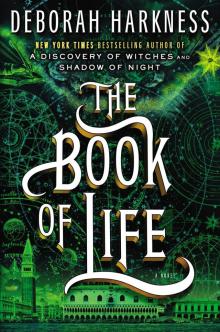 The Book of Life
The Book of Life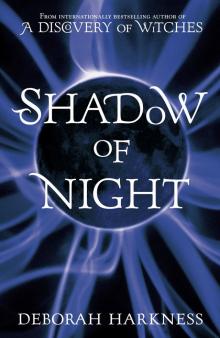 Shadow of Night
Shadow of Night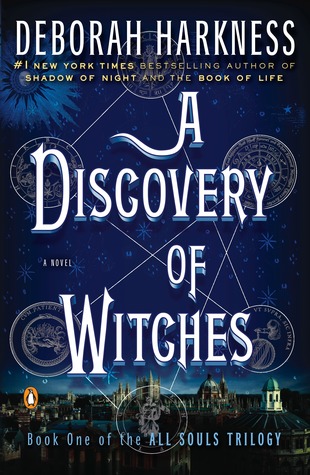 A Discovery of Witches
A Discovery of Witches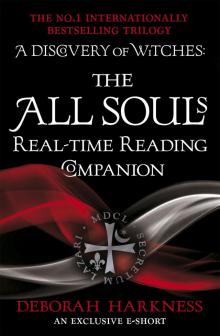 The All Souls Real-Time Reading Companion
The All Souls Real-Time Reading Companion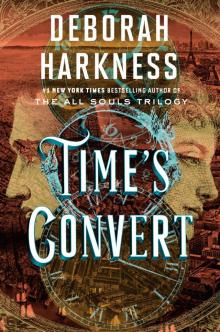 Time's Convert
Time's Convert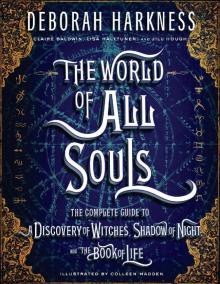 The World of All Souls
The World of All Souls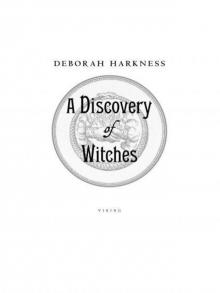 A Discovery of Witches: A Novel (All Souls Trilogy)
A Discovery of Witches: A Novel (All Souls Trilogy)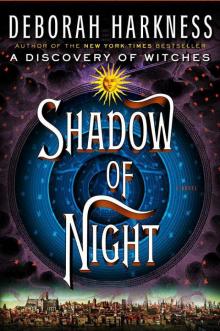 Shadow of Night: A Novel
Shadow of Night: A Novel